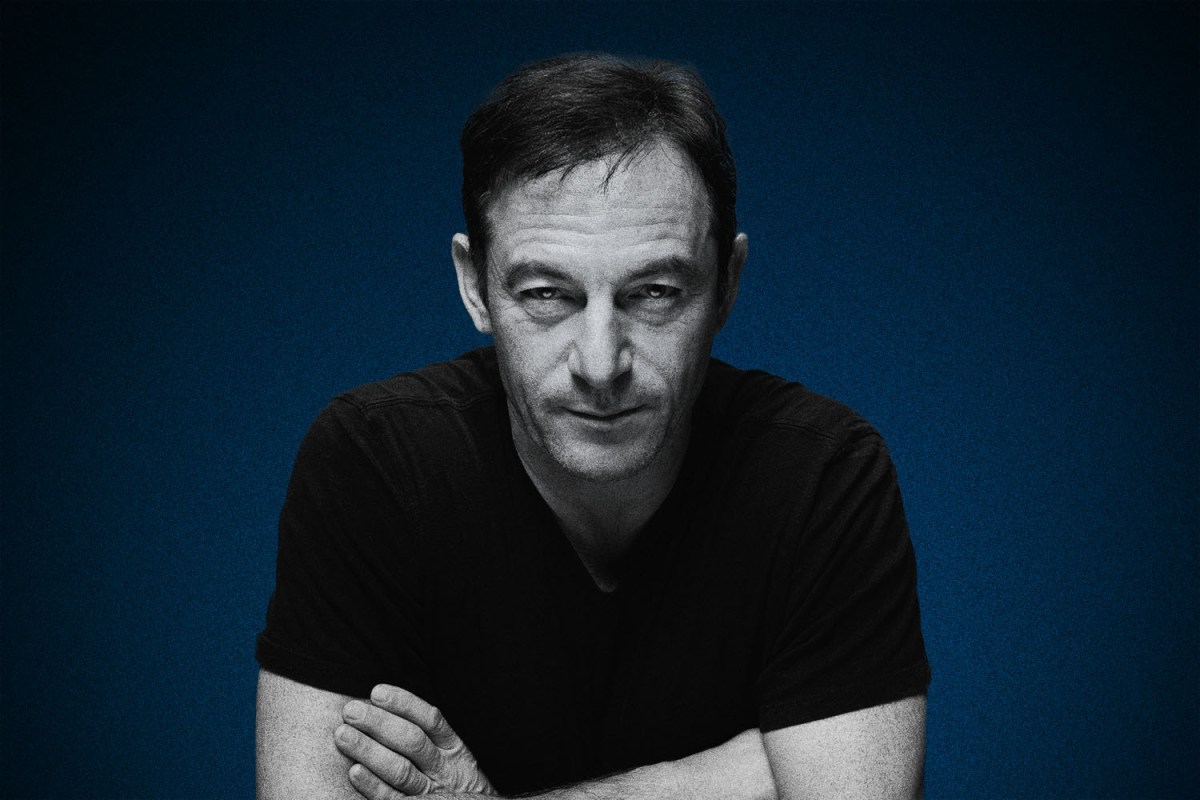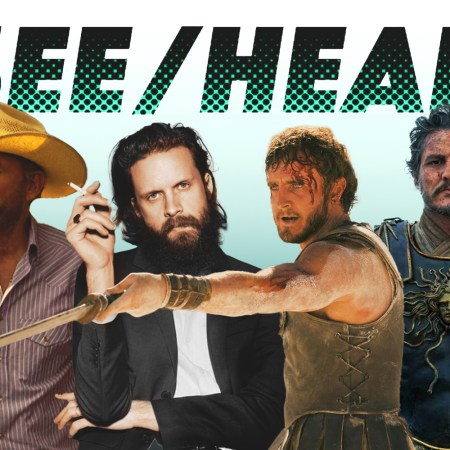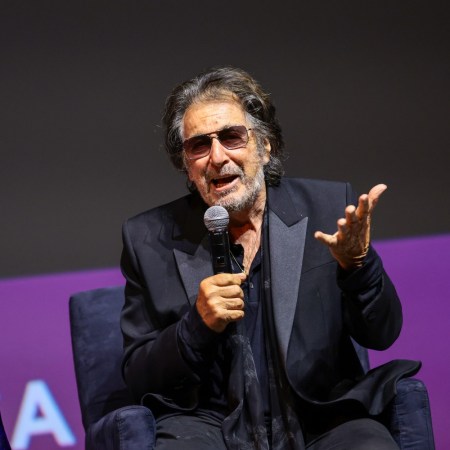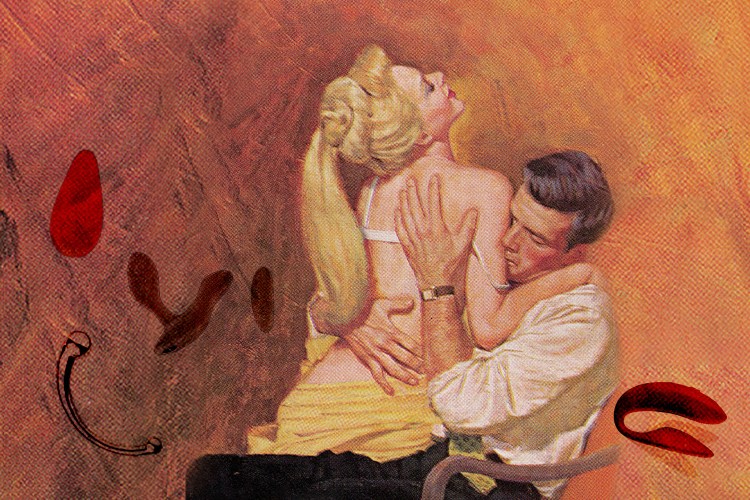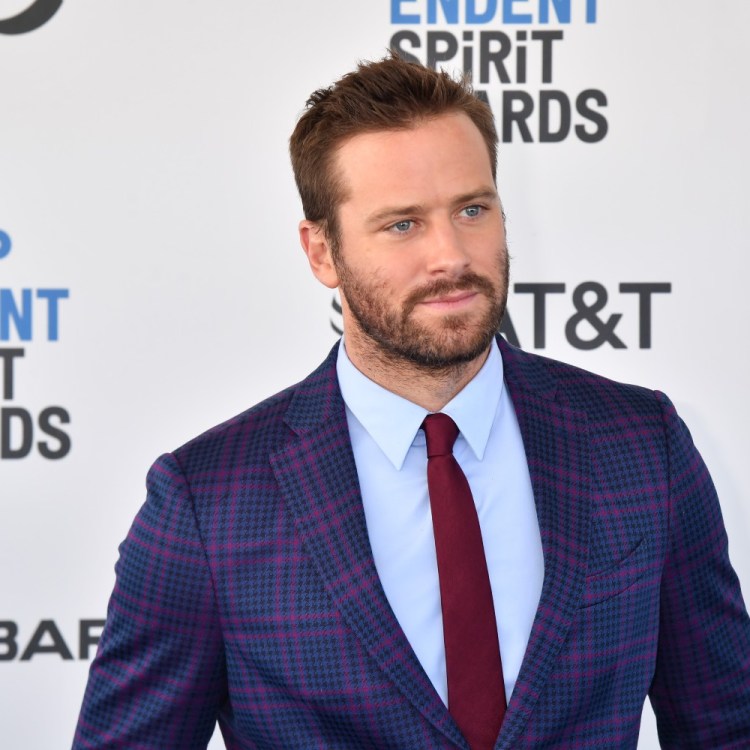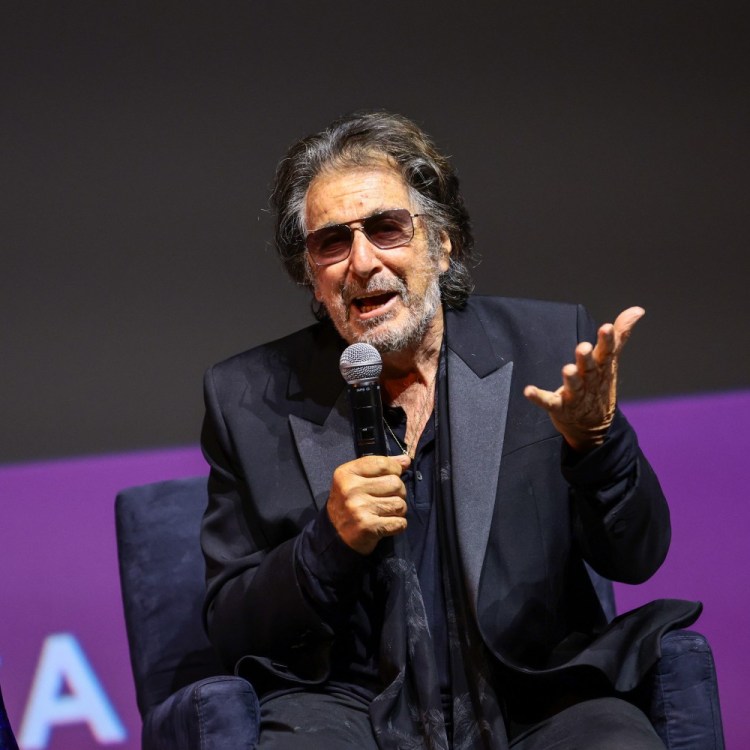The plot summary for the new film Mass is simple: it’s about four parents — those of the victim, and those of the perpetrator — coming together after a school shooting. But the film’s star Jason Isaacs says the film isn’t about a mass shooting, or gun violence at all. Isaacs says the film is as much about the universality of the human condition as it is anything; it’s about forgiveness, grief and intimacy, and not just about the incident that brought these couples together. (That homonymous title — as you might have guessed — lends itself to many interpretations beyond the obvious one.)
He’s adamant that the assumption that Mass is a film about gun violence does it a disservice, and it’s easy to see why. The film is profound, but it is also relatable: we have all suffered trauma and the ways in which it tightens and frays our relationships, and those experiences are laid bare on the screen throughout the 110-minute runtime.
Joining me via Facetime from London in black acetate glasses and a denim shirt, Isaacs is painfully handsome with a disarming and easy charm. He spoke passionately with me for nearly an hour about his latest project and his love for independent film, as well as his role in the hit Netflix series Sex Ed.
InsideHook: Let’s talk about Mass. This is such an important film.
Jason Isaacs: You know what? I’ve got to contradict you immediately. I’m terrified of words like important and powerful, because it means that people don’t want to see a film. There’s the kind of film that people want to see. And then there’s the kind of film that people think they ought to see, but nobody wants to see. And I think this is a film that people want to see or should want to see, because it’s got a thriller/suspense element to it. I mean, we can discuss the themes, I’m sure we will, and it’s about something incredibly important and powerful, themes of forgiveness and healing and hope and all these things.
However, when I first read [the screenplay], I couldn’t stop turning the pages. I was desperate to find out how this day was going to play out with these four people coming into a room with such different expectations and in such an extraordinary situation. And by the time I got to the end, I knew I’d been through this enormous ride. I just cried my eyes out and I laughed a bit, and then at the end, I felt this blast of relief and hope and catharsis.
It’s a film that gives an audience something I haven’t had forever, which is a huge emotional experience watching it, and that they leave feeling that the world is a place full of possibility. I’m so desperate to make sure that people don’t get put off seeing it by thinking that the subject matter is worthy.
What really struck me about the film was that it feels incredibly intimate. There’s a real human element to it that I think you don’t get from reading about these incidents in the news or watching it on TV.
Well actually, I don’t mean to be disrespectful to anybody who’s been through the awful tragedy of a shooting, but to me, the film is not about that at all. That instant is a long way behind them. It’s years ago.
It’s about people whose lives are stuck. They’re stuck in their marriage and they’re stuck in life, because they feel so much blame. And blame was weaponized over the four years when the last president was empowered, and blame is certainly part of the currency in British politics. And a lot of people are held back by a hatred or resentment, whether it’s over someone across the political divide, or nowadays, a vaccine device or within families.
You could wake up and get out of bed and your life can be ruined by carrying anger at someone who is not in the slightest affected by the fact that you are poisoning yourself with this stuff. And so, in many ways, it’s a story about people who want to find the light. They want to relieve themselves of baggage, and that goes way beyond people’s experiences, shootings, just anybody, who recognizes that resentments are hamstringing them in life. It’s destroying their relationships and their possibility of hope.
I think it really drives home that behind these headline stories — events like mass shootings — are real human beings.
We had a screening in Washington the other day for a charity group and it advocates for messages of change, and there were people in the audience who were talking about, they’d lost one family member. It doesn’t have to be a mass shooting. You can lose a family member to a drunken car crash, or you could come back from wars.
This story was as inspired by the South African Truth and Reconciliation Commission, as it was by the meetings that family members have after school shootings, or about the Restorative Justice Program. It’s about people going into a room, recognizing that they want their lives to be better and that they are destroying their own lives by carrying hatred, and that applies to almost everybody. I certainly couldn’t apply it to me.
I think it’s completely universal. For me, I also read it. It has as much to say about marriage as it does to say about grief.
And in a way, this is a film about restorative justice.
I agree. And I think what he did, rather brilliantly, because those meetings, even the Ansley hearings in South Africa — I don’t think they were transcribed anywhere — was [director Fran Kranz’s] imagination and ability to conjure up what he thought might happen. What he thought would happen would be very, very messy. And so at least my character goes in there thinking, “Oh, there is something to be done here,” and he approaches it legally and intellectually. And medically and pharmaceutically. And there are a bunch of ways that he thinks you can fix things and find solutions. My wife comes in because she’s got a list of things that she’s supposed to say from the therapist.
There’s a way that this is meant to play out, but of course it doesn’t, because that would be both dull and not truthful. And it plays out in much messier ways, the things that they have suppressed or things they’re not meant to say, the trigger words that they are meant to avoid, they say. And [my character], who is meant to be managing it for everyone and think he’s above it all, his long repressed feelings erupt out, and what becomes of this incredibly human messy encounter, the thing they get from it, is not answers.
They get something much more human and even slightly spiritual from it and not to be a spoiler or give away what happens to people who want to watch the film, I hope, but it is a film that offers some hope. But it doesn’t get delivered in a way that anybody would expect. Because you can’t approach this schematically, I think.
Tell me a little more about how this is a film about marriage.
[Martha Plimpton and I] had to build the world outside the room for the previous six years. So when and if we slept in separate bedrooms, when we stopped having sex, or when we stopped talking to each other, who was drinking too much, when, how often I was away campaigning, what we did about our daughter who wouldn’t get out of bed or couldn’t go to sleep and who was or wasn’t trying to discipline or change that, then when she started this therapy and specifically as well, exactly how do I force myself into therapy? Had I been dragged in reluctantly and what was meant to happen in the room?
Jay [Perry, Isaacs’s character] is a guy that wants rules. He wants to codify things. He wants to know what she’s meant to say, really buy this therapy thing. Not for himself — he’s above it. He can think beyond these particular personalities, he thinks. But she is meant to say these things because it’s somehow meant to provide some kind of solace for her and maybe she’ll stop being so fucked up. That’s what he thinks. And so that’s what Martha and I had to come up with. And we found ourselves arguing all the time.
We didn’t mind arguing, because some part of us knew that we were half arguing as Jay and Gail. These levels of denial they’re in with each other, and where they are and aren’t really listening to each other anymore. And where they’re blaming the other person or where they’re thinking something can’t be changed or where attitudes have calcified or they’ve dug ditches so deep they can’t see out of them anymore. All these things happen in our marriage, but we’ve stayed together. The other couple have not stayed together. Many couples don’t stay together after the loss of a child. We’ve stayed together because we’re people who want to live, we’ve come to this room because we want things to be better.
The great relationship counselor Esther Perel who has all the podcasts and does the Ted Talk stuff, I’ve seen her talk a lot. I’m a huge fan of hers. And she talks about growing up in this village in Belgium with lots of Holocaust survivors. She said there were two types of people: the ones that didn’t die and the ones that wanted to live. And I’ve seen the same around drug addiction: people who managed to get recovered are people who for some intangible reason at the right moment in their life decided they wanted to live. And Jay and Gail are reaching for something. They’ve come here as … I don’t know if it’s a last desperate move, but it’s in desperation. They want life to be better with each other, for each other and for their lives
Even though on the surface of it, Jay, the other people congratulate him on his activism and success. Whatever they look like to the outside, their insides are festering and they know it.
And that’s a very universal thing and marriages can look very shiny from the outside.
It’s interesting, because we’re often told that living through trauma is easier with loved ones and that’s true, but trauma can also really fray relationships.
When things aren’t going great, it is easy to blame things outside ourselves. And that’s what politicians have been tapping into for a long time. It gives rise to all kinds of reactionary, behavioral fascism, and they can get to a place of blame. They can get to a place of hatred. You can hate the people you love the most.
It really isn’t a film at all about whatever the original traumatic incident was that sparks the necessity for this meeting. This isn’t about that at all. Anyone who’s coming hoping to find some ammunition for arguments pro or against any kind of laws is going to feel short-changed, because it’s a human story about the necessity of forgiveness and the difficulty of forgiveness. And it could have been a drunken car crash. It could have been someone coming back from war. It could have been a fraud. There are many things it could have been. It’s not really about what’s in the mirror, although it’s much discussed in the film. It’s really not about that or what to do about it. It’s more about these people and what they’re carrying.
When things really work, they’re completely specific and completely universal at the same time — because they’re so specific.
And Mass is a character study in a lot of ways.
Look, I love stories. I love being a storyteller, I love being part of stories. I think they have great value in the world. I don’t mean that they should feel worthy. We’re entertained, we’re transported by them, they grip. We have a vicarious thrill and if we’re really lucky, they resonate past the credits where somehow even subliminally, not consciously, they help us make choices and navigate the world, our difficult situations. I think Mass does all those things and I love the independent film world that it’s part of.
By the way, I think the bare minimum any independent film should do, or any film should do, is when it finishes you think, “I’d like to see another film soon.”
It’s a bit like having sex. You have sex and you go, this is great. I should do it more often.
Which speaking of, before we go, I do want to pivot to Sex Education, and I do see a connection between Mass and Sex Ed…
I dare you to find a connection.
Well! I think they’re both in a way about the way we relate to young people, and the things we carry as adults and how it impacts them.
You’ve sparked up a thought with me. I think it has this in common: Sex Ed is providing the sex education for generations of teenagers because they don’t get it from their parents, because we don’t really know what to say for them anymore.
But Sex Ed is doing an incredible job of making people able to talk about things they weren’t able to talk about before and recognizing and celebrating the diversity of taste and that everything’s all right. It’s consensual and just doing things that just can’t be done in school and can’t be done in the household.
And Mass is talking about a subject that should be discussed everywhere all the time, which is how to get out of your bed and start your day feeling grateful. How to deal, how to free your heart from baggage, which is only poisoning you and not the people you are directing you at. And you’re probably directing it out of ignorance because you don’t even know them. And so in some ways, they both do that job.
This article was featured in the InsideHook newsletter. Sign up now.
